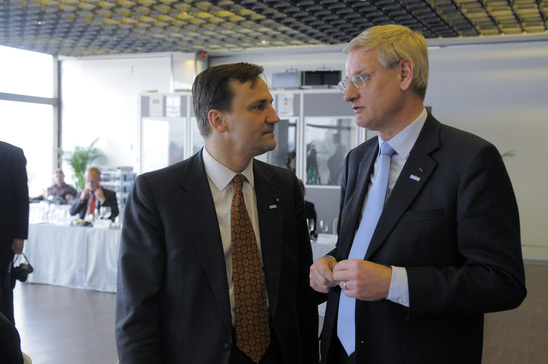
From Carl Bildt and Radoslaw Sikorski, Foreign Ministry of Poland: It was agreed that Visegrad, Nordic and Baltic countries due to their geographic proximity, shared values and interest had an important role to play in promoting democracy, rule of law and security.
Ministers agreed that cooperation between our countries would serve well strengthening our security in a changing international environment. Joint assessment of challenges and joint promotion of our regional security perspective would make our interests more visible and more comprehensible to others in the broader Euro-Atlantic security environment including EU and NATO.
In this context Ministers agreed to look for opportunities to jointly develop capabilities within NATO and EU respectively. Taking into account envisaged limitation of NATO operational engagement after 2014 Ministers called for the development of initiatives which would help to maintain interoperability among Allies’ and Partner’s forces. The need for tangible exercise and training was mentioned specifically.
Ministers discussed and expressed support for the elaboration of a European Global Strategy. Such a strategy would clarify what values and interests the EU should promote, and how to go about it.
The ministers agreed that Europe had an important role in international conflict prevention and mitigation. To enhance its capacity in this respect, the ministers stressed that Europe needed more flexible tools at its disposal, for example through the establishment of a European Institute of Peace, engaged in peace mediation and informal dialogue.
The European Council on defense in December 2013 was discussed and Ministers agreed that the preparations should focus on tangible measures for improving European crisis management capabilities, taking into account a wide security context and a comprehensive approach.
Excerpts from Co-Chairs’ Statement after meeting of Foreign Ministers of the Visegrad, Nordic and Baltic states, 20 February, 2013, Gdańsk. (photo: Czech Foreign Ministry)
Image: czech%202%2020%2013%20Sikorski%20Bildt.jpg
